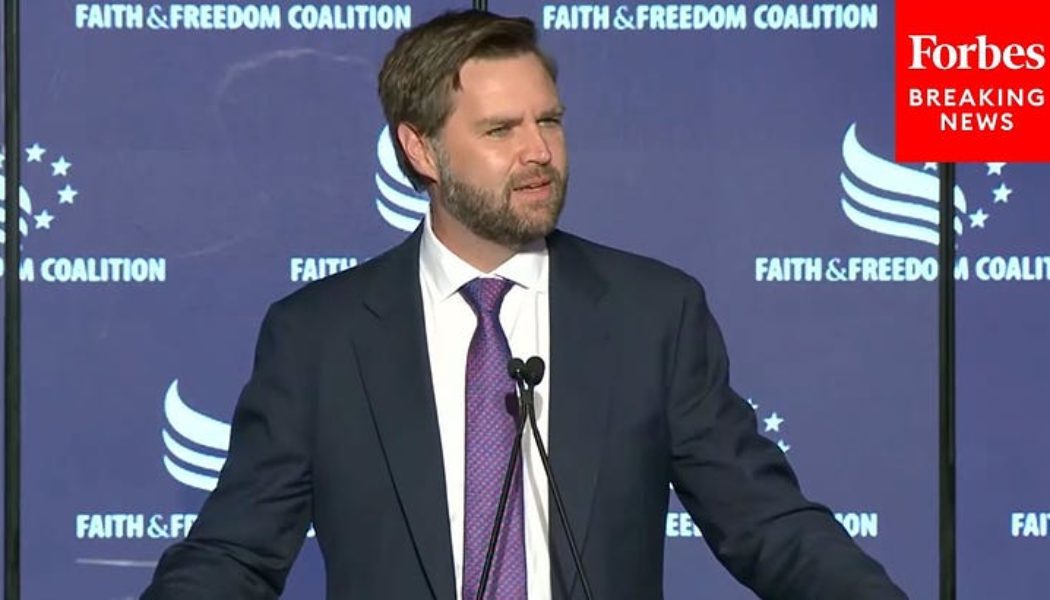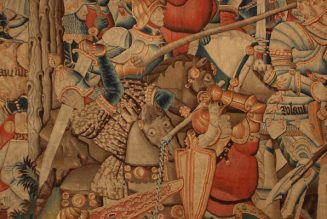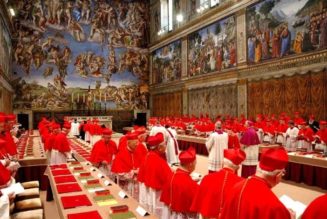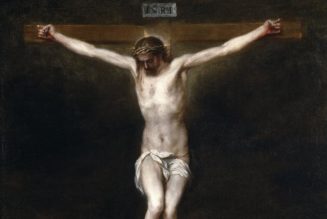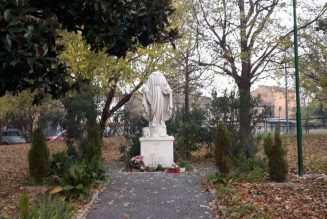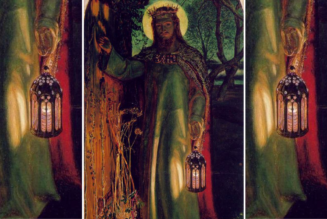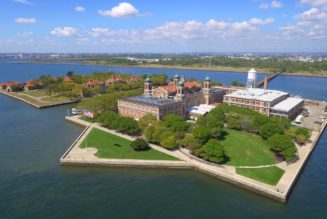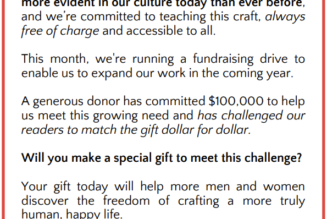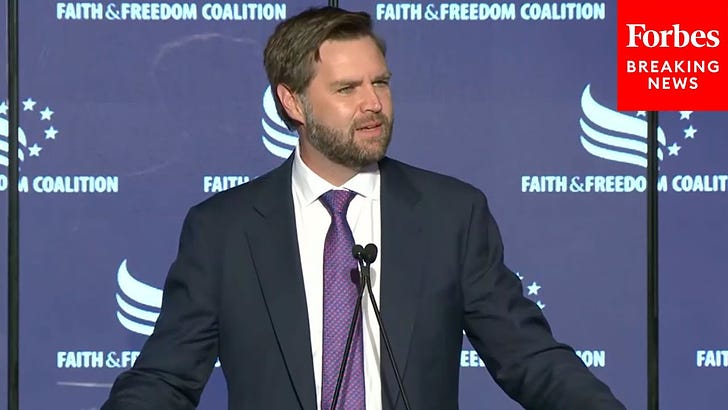
One of the world’s most important newsrooms just offered a finely detailed profile of Catholic convert J.D. Vance and, imagine this, the feature focused on the emotions and ideas that led him to swim the Tiber. This included his intellectual and spiritual attraction to the work of St. Augustine, one of the most important minds in all of Western culture.
Yes, there were political implications linked to this decision since the senator is, after all, the GOP candidate for vice president.
Another powerful newsroom produced a feature about Vance’s faith and the emphasis was on politics, politics and more politics, including lots of material about Vance and a choir of dangerous, authoritarian Catholic thinkers. Has Vance identified with this group? No, but he has said interesting things about some ideas voiced by a few of those folks. Oh, and members of this mysterious group have lots of complex disagreements with each other about doctrine and politics.
Which report was from the Associated Press and which was from the New York Times?
Believe it or not, the Big Idea in this week’s “Crossroads” podcast was that listeners should read the Times religion-desk piece with this headline: “How JD Vance Found His Way to the Catholic Church.” And the Associated Press piece? No need, in my humble opinion, to seek out “JD Vance’s Catholicism helped shape his views. So did this little-known group of Catholic thinkers” unless you have a taste for wink-wink commentary about conservative Catholic arguments that may or may not represent a political threat to Western Civilization.
The tone of the Times piece is established in the overture, of course.
From his new home in Cincinnati, JD Vance would go to St. Gertrude to meet the friar.
It was a fitting place for the millennial aspiring politician, who was drawn to the Roman Catholic Church’s ancient ways. For years he had flirted with joining the church. Now he wanted to explore the desire in earnest.
St. Gertrude Church was led by the Dominican Friars from the Province of St. Joseph, part of a religious order founded in 1216. Its sanctuary smelled of incense but felt modern, its concrete walls pierced with bright stained-glass rectangles in reds and blues.
Mr. Vance would meet with Father Henry Stephan. For months, they read works of theology, mysticism, and political and moral philosophy. Sometimes they went to coffee or lunch. It was bespoke private instruction, a hallmark of Dominicans who are known for their lives of intellect and study.
Then, one summer day in 2019, Mr. Vance, then 35, returned to St. Gertrude, this time to be baptized and receive his first communion in the Dominicans’ private chapel. The friars hosted a celebratory reception for his family with doughnuts. He chose as his patron Saint Augustine, the political theologian whose fifth-century treatise “City of God” challenged Rome’s ruling class and drew Mr. Vance to the faith.
Lacking an interview from Vance or the Dominican priest (that whole confession and “spiritual father” thing is relevant), the Times leaned on a weighty and revealing essay that the convert wrote for the Catholic journal called The Lamp. That’s the same mini-memoir that I quoted in my recent “On Religion” column: “At crucial times in life, J.D. Vance focused on ‘Wisdom from the Book of Mamaw.’ ”
In other words, there is an emphasis on how this journey to Rome was linked to the spiritual lessons of his past — especially the unique soul of the pistol-packing, Bible reading, out-cussin’ the sailors grandmother who, according to Vance, saved his life.
Oh, it’s also crucial that “Mamaw” was a diehard, lifelong, populist Southern Democrat, as opposed to being some kind of country-club, lace-collared Republican.
Is the Times piece interested in Vance’s politics? After all, he is now in a trial political marriage with Donald Trump. Here is the key passage about that:
… (His) quieter, private conversion to Catholicism … reveals some core values at the heart of his personal and political philosophy and their potential impact on the country.
Becoming Catholic for Mr. Vance, who was loosely raised as an evangelical, was a practical way to counter what he saw as elite values, especially secularism. He was drawn not just to the church’s theological ideas, but also to its teachings on family and social order and its desire to instill virtue in modern society.
That worldview served as a counterpoint to much of his messy childhood, and meshed with his own criticisms of contemporary America, from what he saw as the abandonment of workers to the unhappiness of “childless cat ladies.” It has also infused his politics, which seeks to advance a family-oriented, socially conservative future through economic populism and by standing with abortion opponents.
Now, contrast that content with this Times transition paragraph, which I will confess made me laugh out loud:
If President Biden, who was raised Catholic, represents the working class and social justice-oriented Catholicism that defined his era, Mr. Vance reflects the traditionalist wing of the church that has taken root in his own generation.
Imagine the blue streak of curse words that sentence would have elicited from Mamaw, the old-school populist Blue Dog Democrat!
As for the Associated Press, this complicated passage will tell readers what they need to know about the focus of this piece:
His conversion … put Vance in close touch with a Catholic intellectual movement, viewed by some critics as having reactionary or authoritarian leanings, that has been little known to the American public until Vance’s rise to the national stage as the Republican vice presidential nominee.
These are not your father’s Catholic conservatives.
The professors and media personalities in this network don’t all agree on everything — even on what to call themselves – but most go by “postliberal.” Vance has used that term to describe himself, though the Trump-Vance campaign did not respond to questions about where Vance sees himself in the movement and whether he shares some of the beliefs promoted by many postliberals.
Postliberals do share some longstanding Catholic conservative views, such as opposition to abortion and LGBTQ+ rights.
But where Catholic conservatives of the past have seen big government as a problem rather than a solution, the postliberals want a muscular government — one that they control.
You can hear the Theme from Jaws playing in the background during this follow-up passage:
Catholic journals for years have bristled with debates about postliberalism, but with little public attention — in part because its adherents are few and its views are far from mainstream.
But now, postliberals have an avid listener in Donald Trump’s running mate.
By all means, seek out the Times piece and, especially, follow that link to Vance’s own words at The Lamp.
Where should journalists go next when seeking insights into these complicated matters? I suggest making a call to Robert P. George of Princeton University.
Enjoy the podcast and, please, pass it along to others.
